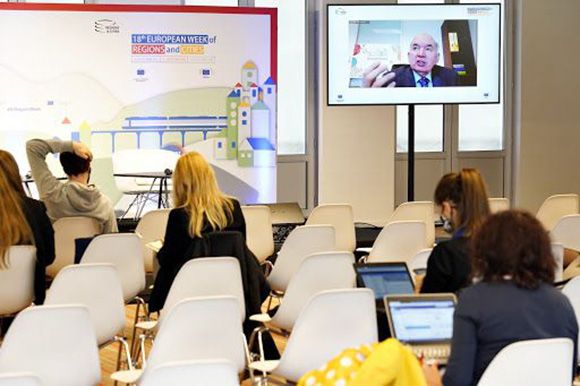
Cohesion Policy currently accounts for almost a third of the EU's total budget and ultimately aims to generate a truly grassroots movement by bringing together beneficiaries of cohesion funds. Yet Miklós Barabás claims that “the EU capital is too far away from the ordinary people” and, in order to solve this, something needs to change.
The #EURegions talk “Designing effective strategies to communicate on cohesion policy in cooperation with daily media” was part of the European Week of Regions and Cities in Brussels. On Wednesday, speaker Miklós Barabas, director of the European House in Hungary, talked about the project "Meet the Citizen: My way through the European Labyrinth". It’s a 12-month project which includes five countries in Central and Eastern Europe and the challenges and achievements with cohesion policy.
During the talk, Barabás mentioned a visit to a small village in the north of Hungary with only 800 inhabitants. While visiting, 20 of the inhabitants met with Barabás to have a discussion about how cohesion policy could help them. During the visit one of the citizens in the village stepped forward and said that they needed €25,000 to clean up a polluted lake but they didn’t really know how cohesion policy would help them. Barabás continues by pointing out how little these people knew about the cohesion policy and the European Union, even if they themselves were a part of it. “Cohesion policy is too general, too big and too difficult to understand,” he said.
So how can the EU and its communication regarding cohesion policy be improved?
According to Barabás there are two main changes that need to be implemented. The first change lies in being present in the region and connecting to the people: “the EU is an outside actor which is bureaucratic,” he says, continuing with: “We should not forget to talk to local people. The importance of what the local people think cannot be forgotten”. The second change, according to Barabás, lies in involving the city, local authorities and the media: “a way we can change the situation is to present a success story on a local level and to involve the mayor, as the mayor is often a dominant voice in the local media”. By doing that, he claims that the policy could be more present in everyday life for citizens, even when the EU is not directly present.
Cohesion policy 2021-2027
As negotiations continue over the EU’s budget for the period 2021-2027, cohesion policy will be renewed. 80 simplification measures will be put in place in different areas. Even if the European Union still emphasises that member states, local and regional authorities and civil society should all play their role in ensuring that the proposals are implemented, Barabás says that “a new chapter for cohesion policy will begin and the door will be open”. And, with an encouraging voice, he says that “people should identify the local needs to improve the way of life and local living. Citizens' engagement is important, active citizens are needed”.
By Dinah Ahl, Finland



